
Christ on the Cross - by Velazquez
“Are you the king of the Jews?”
Pontius Pilate’s question about Jesus’ identity, and Jesus’ response, bring us to the heart of the ongoing drama of Good Friday and the whole Christian life.
The accounts of Jesus’ passion all center on whether Jesus is a king and, if so, what kind of king he is. On Palm Sunday, we saw what kind of king most of Jesus’ contemporaries were anticipating and hoping for. When Jesus rode into the city on a donkey accompanied by a colt, St. Matthew says this was to fulfill Zechariah’s prophecy about how a Messiah-king would enter the city, “Say to daughter Zion, ‘Behold your king, who comes to you, meek and riding on a donkey, and on a colt, the foal of a donkey.” Sitting on a donkey is what King David had his son Solomon do when he made him king. When the crowds started laying down their cloaks on the road for him to ride upon, this was a sign of respect normally reserved for the kings of old. As the crowds started shouting out with the words of Psalm 118, they indicated that they saw a real connection between Jesus and his most famous royal ancestor according to the flesh: “Hosanna! Blessed is he who comes in the name of the Lord! Blessed is the kingdom of our father David that is coming! Hosanna in the highest!” All of these were signs that they believed an enthronement was taking place, the installation of someone whom they hoped would do in their own age similar things to what King David had done a millennium before, to triumph over foreign armies and unite under one strong Jewish ruler the people of Israel.
The enthusiastic people in the crowds on Palm Sunday were not the only ones mistaken about what the inauguration of Jesus’ kingdom would bring. In St. Luke’s account of the Last Supper, right after Jesus described how one of them would betray him, the apostles started arguing about which of them should be regarded as the greatest. As had happened many times in Jesus’ public ministry, the apostles, too, looked toward Jesus’ kingdom in temporal terms, hoping to have the choicest portions of what they predicted would be sizeable spoils. Jesus corrected them and called them to a different standard. Together with the unforgettable example of doing the service of a slave by washing their feet, Jesus said, ““The kings of the Gentiles lord it over them; … but among you it shall not be so. Rather, let the greatest among you be as the least, and the leader as the servant. … I am among you as the one who serves.” His kingdom would be defined not by thrones but by towels and the greatest among would be those who followed his example of serving others to the point of giving themselves as a ransom to save others’ lives.
The Roman soldiers likewise had a notion of kingship that was incompatible with Jesus’ lifestyle: a meek king would be an anomaly; a king who would suffer and be crucified was unimaginable. For them, to rule was to be powerful and for that reason they could respond only with derision and cruelty to the suggestion that the Nazarene carpenter before them was a king. After scourging him nearly to death, they crowned him with thorns, clothed him in phony-royal garments, repeatedly spat upon him, slapped and beat him with the reed they placed in his hand as a pseudo-scepter, crying out in mock adulation, “Hail, King of the Jews!” Pilate would even join in the action after Jesus had been brought out to him adorned in mock garb, saying, “Behold your king!” and “Shall I crucify your king?”
But it was in Jesus’ dialogue with Pontius Pilate that the real confrontation and contrast between the world’s notion of kingship and Christ’s — both then and now — are put fully into relief. After the Roman governor asked whether Jesus believed himself to be the King of the Jews, Jesus answered: “My kingdom does not belong to this world. If my kingdom did belong to this world, my attendants [would] be fighting to keep me from being handed over to the Jews. But as it is, my kingdom is not here.” Pilate was able at least to understand that to be a king of any consequence, one needed to have armies, and the fact that Jesus would not be at the head of a group of soldiers causing trouble for Rome should have been enough for Pontius Pilate to find in Jesus no threat to Caesar’s retaining what Caesar claimed. When Pilate, however, pressed the issue and asked Jesus, “Then you are a king?,” we get to the heart of what Jesus’ kingdom is about: “You say I am a king,” Jesus replied. “For this I was born and for this I came into the world, to testify to the truth. Everyone who belongs to the truth listens to my voice.”
About this dialogue, Pope Benedict XVI comments in his brilliant new book, Jesus of Nazareth, Part II: “With these words Jesus created a thoroughly new concept of kingship and kingdom, and he held it up to Pilate, the representative of classical worldly power.” In contrast to worldly force, Jesus proposed truth: “Dominion demands power; it even defines it. Jesus, however, defines as the essence of his kingship witness to the truth.” Jesus came to bear testify to the truth, which means “giving priority to God and to his will over against the interests of the world and its powers.” Jesus declares that God —not physical force — is the fundamental reality of life. “In this sense,” the Pope continues, “truth is the real ‘king’ that confers light and greatness upon all things. … If man lives without truth, life passes him by; ultimately he surrenders the field to whoever is the stronger. ‘Redemption’ in the fullest sense can only consist in the truth’s becoming recognizable. And it becomes recognizable when God becomes recognizable. He becomes recognizable in Jesus Christ. In Christ, God entered the world and set up the criterion of truth in the midst of history. Truth is outwardly powerless in the world, just as Christ is powerless by the world’s standards: he has no legions; he is crucified. Yet in his very powerlessness, he is powerful; only thus, again and again, does truth become power.”
The “center” of Jesus’ message “all the way to the Cross, all the way to the inscription above the Cross,” Pope Benedict emphasizes, “is the kingdom of God, the new kingship represented by Jesus. “And this kingdom is centered on truth. The kingship proclaimed by Jesus, at first in parables and then at the end quite openly before the earthly judge, is none other than the kingship of truth. The inauguration of this kingship is man’s true liberation.”
To be saved is not only to “listen to [Jesus’] voice but to “belong” to the truth “all the way to the Cross.” It’s not just to live according to the truth, but in communion with the Truth incarnate. In contrast to Pontius Pilate’s follow-up question, “What is truth?” — which evinced the relativistic roots of his pusillanimity in condemning an innocent man — and to the taunts of the “might makes might” mob at the foot of the Cross, “If you are a king, save yourself!,” we see the witness of the Good Thief, who recognized a truth in the one hanging on the Cross beside him that blood couldn’t hide or excruciating pain couldn’t obscure. He turned to one who would expire humanly before he would and asked him to help him belong to the truth in the only way he thought possible: “Jesus, remember me when you come into your kingdom.” Earthly kingdoms end with the death of a king; Jesus’ kingdom, the Good Thief somehow saw, was about to begin. He had no pretensions that he was going to live in that kingdom, but asked minimally to be remembered, which is the last wish of a dying man. The one hanging, however, beneath the inscription “Jesus of Nazareth, the King of the Jews,” responded with a largesse that befitted the king of heaven and gave him what he didn’t dare dream: “Truly I tell you, today, you will be with me in paradise.”
On this Good Friday, let’s seek to follow Dismas into that kingdom, by belonging to fully living in the Truth to which Christ gave witness in life, death and glorious resurrection.
Please help us in our mission to assist readers to integrate their Catholic faith, family and work. Share this article with your family and friends via email and social media. We value your comments and encourage you to leave your thoughts below. Thank you! – The Editors













